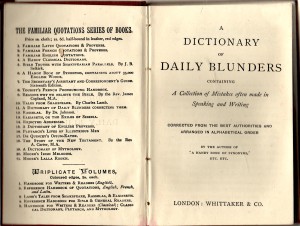This is a useful pocket guide to some extent, but is frequently supercilious and downright patronising. Often the compiler treats the reader as if they were a halfwit, especially in the matter of pronunciation.’ Reindeer is pronounced rain-deer ‘ it advises. ‘ Salver is pronounced sal-ver, not sar-ver’, apparently. Then it warns readers not to confuse one word with another with a similar spelling. Thus ‘ corpse ‘ should not be confused with corps. Nor should anyone write continential ( which doesn’t exist as a word ) when they mean continental ? Has anyone ever done that ?
The corrected pronunciation of some words is questionable, to say the least. We are told that with ‘ abdomen’ , the emphasis should be on the second syllable, not the first . With ‘ mediocre ‘the first syllable should feature a short ‘e’. Today, there is no agreement on these two examples. In other instances the suggested pronunciation is bonkers. The word ‘retch ‘ according to this book, should be pronounced ‘ reach’. ‘Rabies has three syllables ‘we are informed, and should be pronounced rar bee ez. Sheer madness! Even if the word has a foreign derivation, by 1888 its place in the English language should have been assured. Disappointingly, it has nothing to say about the vexed question of whether ‘poor ‘ should be pronounced poo-er, as some grammarians insisted, or ‘pore’. Ghost-writer M. R. James famously derided those who favoured the latter pronunciation in his story ‘The Mezzotint ‘. But doubtless the Provost of Eton was a bit of a snob. Nor does the Dictionary suggest how ‘economics ‘ or ‘controversy ‘ should be pronounced. It ought to come down heavily on two of the worst solecisms of our own time, ‘less’ for ‘fewer’ and ‘reticent’ for reluctant, but it doesn’t. However, it is good to see that in 1888, 34 years before the BBC was founded, and many years before newspapers had a role in forming popular opinion, we are told that the plural of ‘medium’ is ‘media’. It is also interesting to note that back in 1888 common speech was as plagued as it is today with the ubiquitous ‘ you know ‘. ‘All these “ you knows “ would be better left out ‘ advises our author. Quite.
Disappointingly, and indeed, rather predictably, the booklet perpetuates the grammatical correctness of the gendered pronoun, as in the correction to ‘I do not think anyone to blame for taking care of their health’. ‘Their’ should be ‘his’, it advises, rather chauvinistically. Today, you don’t have to be a feminist to prefer the use of the gender-free ‘their‘ in this case.
All in all, A Dictionary of Daily Blunders contains almost as many blunders masquerading as truths as it does corrections to perceived blunders. No wonder the author, who also compiled A Handy Book of Synonyms,wanted to remain anonymous.
[R.M.Healey]

“We are told that with ‘abdomen’ , the emphasis should be on the second syllable, not the first.”
I am reminded of Gershwin’s “It Ain’t Necessarily So”, on Old Testament Jonah – “He made his home in / A fish’s abdomen / It ain’t necessarily so.”